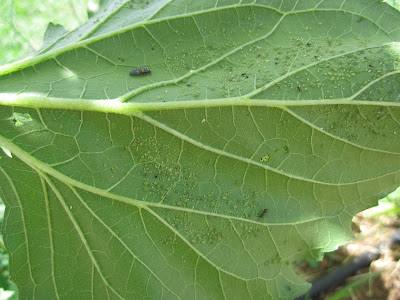So I've been reading a bit of Botany of Desire by Michael Pollan here on the farm. One of Pollan's main points is that while we humans arrogantly like to think of ourselves as in charge of the little plots of land we tend, in reality the plants have more of a say than we give them credit for. That is, he talks about the ways in which plants will "use" animals, such as humans, to carry their seeds for them far and wide, and will develop traits that those animals desire in order to be fruitful and multiply. To snag human help, for example, corn gets big and fat, fruit gets sweeter, etc., etc. In this sense, plants domesticate us similarly to the way we domesticate them. We are both subject and object when we play with our food.
In light of this, I've been thinking about the many ways that we are not in charge of our gardens, and one such project this week has illuminated this truism for me. In doing some aphid control on our sunflowers, it was revealed to me that we are in fact not the only farmers working in the fields. Aphids, as it turns out, are sometimes called "ant cows" because of the way some species of ants will farm them. These ants "milk" the aphids for the honeydew they produce by stroking them with their antennae. Some ants will even gather aphid eggs and store them over winter, then carry the newly hatched bugs back to the plants in the spring. The
y will fight off aphid predators, and queen ants will even carry aphid eggs with them when starting a new colony, in much the way that Europeans carried prized seeds with them when colonizing the Americas.
This to me is absolutely fascinating. I was so captivated by this process that I took time to snap a few pictures while I was pruning the more infested sunflower leaves from our house garden. Check it out:

Those little green bugs you see are the aphids. The top picture is one of my faves because you can see the "milking" in action. So cool! Also, the other bug you see in the top-left of the second picture is a young ladybug. If you have aphids in your garden, ladybugs are your best friends. Unlike the ants which are the farmers in this food web, ladybugs are the hunters. When they feed on the aphids, they kill them (the ants don't kill when they suck the honeydew), so they help get these "pests" out of your garden before they suck the juices out of all your plants and deposit toxic saliva all over them. Here's a nice close-up of one of these young ladies:

Some lessons to take from all this: While we think of farming as something peculiarly human, something that sets us apart from the "less evolved" creations, it is in actuality an act shared with a creature as small and "simple" as an ant (and likely countless others, if we took the time to notice). Yet another example of how we ain't so special after all.
Second, as an aside, is the question of "good" or "bad" creatures in the garden. We tend to think of corn as good and pigweed as bad, ladybugs as good and aphids as bad. But its all a matter of perspective. Ladybugs, after all, are not very good for aphids, and aphids are wonderful for ants and ladybugs. And in the case of weeds it becomes even more blurry. Pigweed is in fact edible (its a form of wild amaranth), but we pull it out without hesitating because we prefer the taste of cultivated veggies. Neither are good or bad. They're just plants.
Third, and perhaps most important, is that when we plant a garden, it really isn't our garden. We may be planting the seeds and encouraging some plants to grow while killing others, but really we are just assisting in the creation of an ecosystem that quickly leaves our control (Pollan might argue that even planting the seeds is out of our control -- we are merely being manipulated by various species of plants who wish to be propagated). On the underside of each sunflower leaf that I plucked was an entire food web, consisting of aphids in all stages of life, ladybugs in various stages as well, and hungry ants working just as hard as we are to keep a steady food supply. This is as much their farm as it is ours. Its really quite humbling.
Of course, recognizing that we all equally own -- or equally do not own -- this plot of land isn't gonna keep me from sending those ants and aphids packing. Girl's gotta eat, after all.

2 comments:
I'm excited at all you're learning and doing out West, Steph--keep up the good work! And keep blogging too--although your upcoming zine project might very well take up some of your writing energy (be sure to mail a copy to us when it's done! Love, Matt
Inspired. You've given me a new respect for this farming thing. a Greater non human perspective. An ancient polyspecies pastime. Amor
Post a Comment